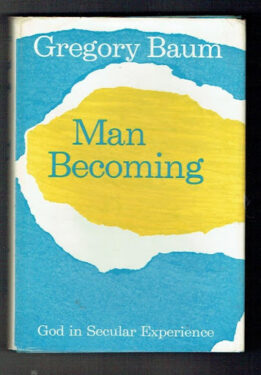For much of my life I thought I lived in a kind of a “two level universe.” There was the supernatural world and there was the natural world. They were separate. For me the supernatural world included the Eucharist and the other sacraments, sanctifying and actual grace, heaven, hell, purgatory, the bible and other “spiritual books.”
The natural world included everything else, ranging from study and school to recreation and entertainment, from how people earned their living to family life. Though I am certain that from time to time I may have reflected on the separation of the natural and supernatural orders, for years I was not able in my mind to bridge the division. There was an area of reality that was sacred and holy and another area that was secular.

Back in the early 1970’s my reading of Gregory Baum’s provocative book “Man Becoming” (Herder and Herder, 1970) marked at least a start toward putting the two worlds together. Many philosophy and theology texts that I have read since reading Baum’s book helped me to overcome what I look back on as an erroneous view about a “two level universe.” In his “Christian Community: Response to Reality” (Holt Rinehart and Winston, 1970) Bernard Cooke writes the following:
“In some ways, it could be said that the Christian is the man who most treasures ‘the secular.’ Or perhaps it would be better to say that the Christian cannot, in the last analysis, admit a dichotomy between the sacred and the secular. For him, the whole of created reality, especially the experience of life within the Christian community, is meant to be the sacrament of the presence of Christ, who himself is the sacrament of the Father.
“All creation shares in the revelation of God, though in varying degrees, and the very action of God in creating the world is seen to coincide with his action of revealing himself in his Son.
“When all is said and done, however, the Christian answer to the question, ‘Who is God?’ is very simple; God is the Father of our Lord, Jesus Christ. He is our Father who reveals himself to us in his Son and his Spirit.” (p. 187)
God’s grace is everywhere. By grace I mean God’s self-gift, inviting us to share in God’s life of unfathomable love. God’s self-gift, God’s invitation does not take place only in what I once imagined as the sacred realm. If by “secular” is meant some area or dimension of reality in which the redeeming Christ and his Spirit are not present, then there is no such area or dimension. All, except sin, is sacred. Christ’s redeeming action changes everything.
I think of the last few lines of Georges Bernanos’ masterpiece, “The Diary of a Country Priest.” The country priest is on his death bed and the priest, a friend, who is ministering to him, apologizes for not having the sacred oils to anoint him. The country priest replies: “Does it matter? Grace is everywhere…”
I love the first line of Gerard Manley Hopkins’ poem “God’s Grandeur.” Usually I think of the opening words as pointing to the beauties of nature. The line is “The world is charged with the grandeur of God.”
Now I am thinking of Hopkins understanding that God’s grace is everywhere. Because of the presence of the Risen Christ and his Spirit in the world there is no activity that cannot be holy except sin.
What we might ordinarily think of as secular activities, such as working or recreating, can lead us closer to God. When I was in high school and college I regularly said the “Memorare” every morning, consecrating the day to God. I saw the prayer as sanctifying the day.
That’s a wonderful and beautiful practice but I think even when we are not explicitly praying or thinking of the presence of Christ and his Spirit, we may be allowing the Holy Spirit to sanctify us.
Of course I cannot prove this but it seems to me we may be cooperating with the loving presence of the Holy Spirit without explicitly thinking of the Spirit.
When I give a homily at a wedding I often say that the sacrament that bride and groom are administering to one another will color their entire lives.
It will influence the obviously important actions such as lovingly supporting one another throughout their lives but it can also influence them as they engage in apparently less important actions such as doing laundry and washing dishes.
I am claiming that God is present not only to married couples but to everyone who has accepted God’s self-gift, God’s invitation to share God’s life of unfathomable love.
Father Lauder is a philosophy professor at St. John’s University, Jamaica. He presents two 15-minute talks from his lecture series on the Catholic Novel, every Tuesday at 9 p.m. on NET-TV.
